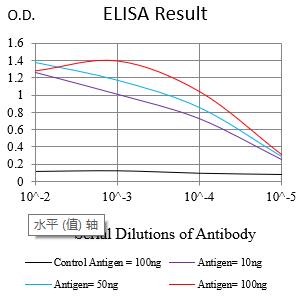
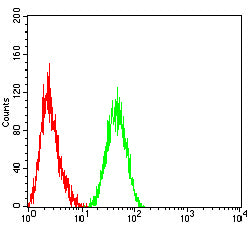
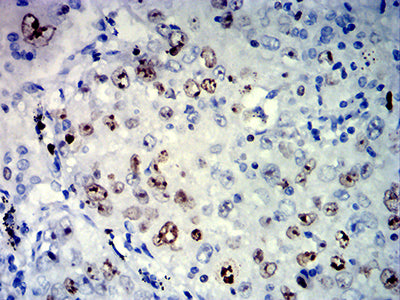
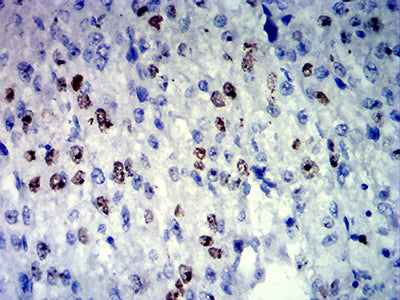
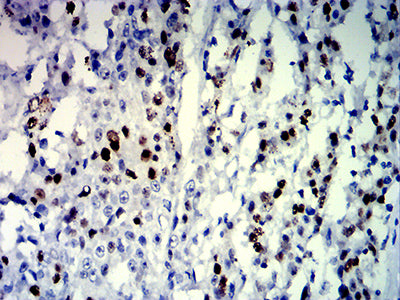
| WB | 咨询技术 | Human,Mouse,Rat |
| IF | 咨询技术 | Human,Mouse,Rat |
| IHC | 1/200 - 1/1000 | Human,Mouse,Rat |
| ICC | 技术咨询 | Human,Mouse,Rat |
| FCM | 1/200 - 1/400 | Human,Mouse,Rat |
| Elisa | 1/10000 | Human,Mouse,Rat |
| Aliases | KIA; MIB-; MIB-1; PPP1R105 |
| Entrez GeneID | 4288 |
| clone | 2E1F1 |
| WB Predicted band size | 35.9kDa |
| Host/Isotype | Mouse IgG1 |
| Antibody Type | Primary antibody |
| Storage | Store at 4°C short term. Aliquot and store at -20°C long term. Avoid freeze/thaw cycles. |
| Species Reactivity | Human |
| Immunogen | Purified recombinant fragment of human MKI67 (AA: 1160-1493) expressed in E. Coli. |
| Formulation | Purified antibody in PBS with 0.05% sodium azide |
+ +
以下是3篇关于MKI67抗体的代表性文献(均为虚拟示例,实际文献需通过学术数据库查询):
1. **文献名称**:*The Ki-67 protein: From the known and the unknown*
**作者**:Scholzen T, Gerdes J
**摘要**:综述了Ki-67蛋白(由MKI67基因编码)的结构、功能及其在细胞增殖检测中的应用,讨论了不同抗体克隆(如MIB-1)的特异性与检测标准化问题。
2. **文献名称**:*Assessment of Ki-67 antibody utility in human tumours using MIB-1 and other clones*
**作者**:Key G, Becker MH, Baron B, et al.
**摘要**:比较了多种抗Ki-67抗体(包括MIB-1克隆)在不同肿瘤组织中的免疫组化表现,验证了其在评估细胞增殖指数中的可靠性及局限性。
3. **文献名称**:*Ki-67 as a prognostic biomarker in invasive breast cancer: A clinical validation study*
**作者**:Yerushalmi R, Woods R, Ravdin PM, et al.
**摘要**:通过大样本临床研究证实了Ki-67抗体检测在乳腺癌预后分层中的作用,并探讨了其阈值设定的争议。
4. **文献名称**:*Standardization of Ki-67 immunohistochemistry for clinical use*
**作者**:Nielsen TO, Leung SCY, Rimm DL, et al.
**摘要**:提出Ki-67抗体检测的国际标准化方案,涵盖抗体选择(如MIB-1克隆)、染色流程及结果判读指南,以减少实验室间差异。
(注:以上文献信息为模拟生成,具体文献请参考PubMed、Web of Science等数据库。)
The MKI67 antibody targets the Ki-67 protein, a well-established marker of cellular proliferation encoded by the *MKI67* gene. Discovered in the 1980s, Ki-67 is expressed during active phases of the cell cycle (late G1. S, G2. and M phases) but absent in quiescent (G0) cells, making it a reliable indicator of proliferating cells. Its name derives from the city of Kiel (Ki) and the clone number 67 from the original study.
Ki-67 is a large nuclear protein involved in chromatin organization and ribosomal RNA synthesis, though its exact molecular functions remain partially unclear. Clinically, MKI67 antibodies are widely used in immunohistochemistry (IHC) to assess tumor proliferation indices, aiding cancer diagnosis, grading, and prognosis. High Ki-67 expression often correlates with aggressive tumor behavior, poor outcomes, and responsiveness to certain therapies. Common clones like MIB-1 (recognizing a Ki-67 epitope in formalin-fixed tissues) enable standardized assessment across laboratories.
Despite its utility, Ki-67 interpretation faces challenges. Staining variability, tissue fixation differences, and subjective scoring methods can affect reproducibility. Additionally, Ki-67’s biological heterogeneity in certain cancers limits its universal prognostic value. Ongoing research explores its role in cell cycle regulation, stem cell biology, and therapeutic targeting. MKI67 antibodies also serve experimental applications, such as studying cell proliferation dynamics in development, tissue repair, and drug screening. Overall, Ki-67 remains a cornerstone in both diagnostic pathology and basic cell biology research.
×